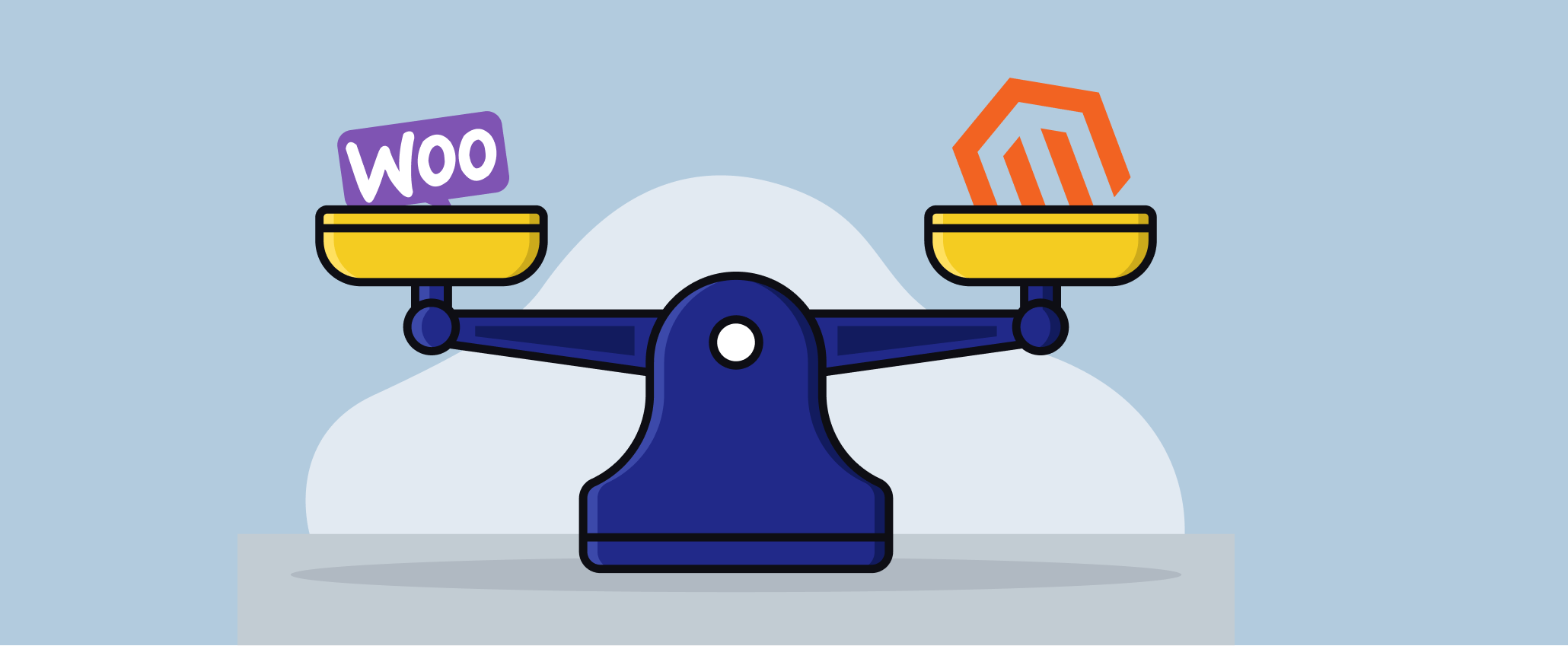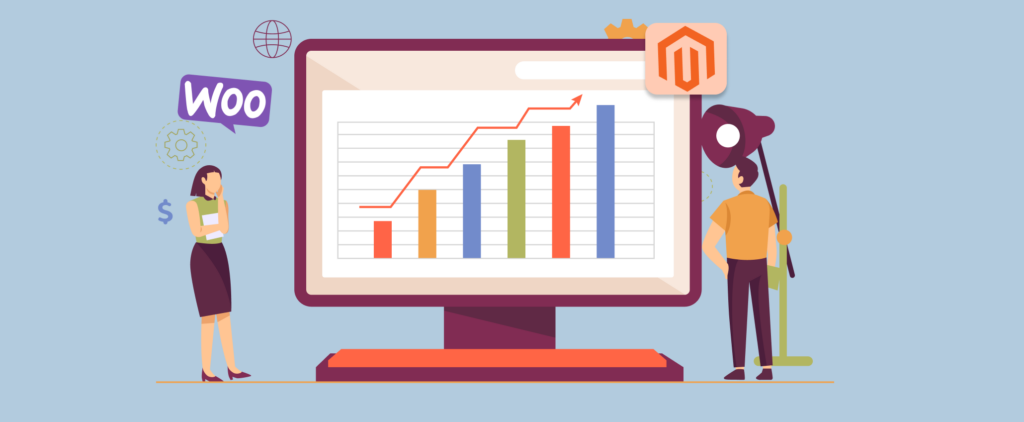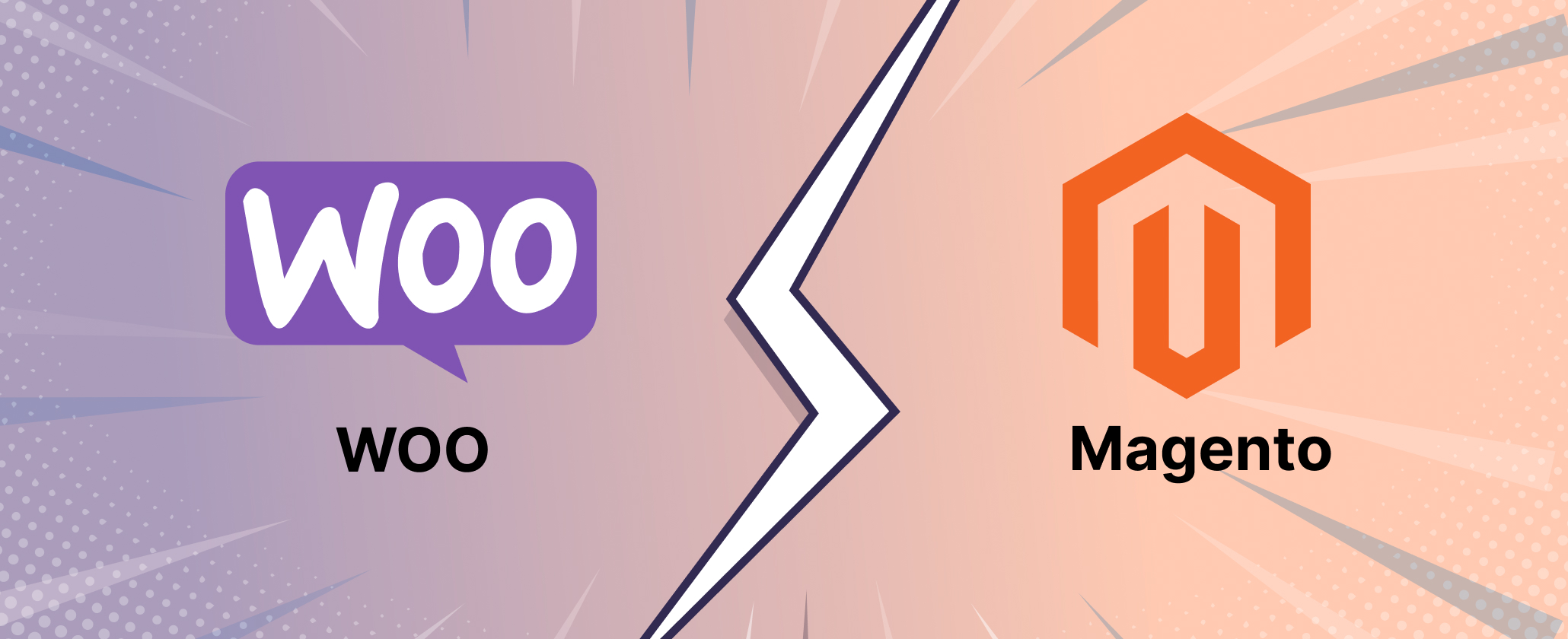Are you wondering which one to consider – Magento or WooCommerce – for your business website? Selecting the appropriate platform plays a great role in realizing online business success. In this article, we will discuss Magento vs WooCommerce in detail where each one’s components, ability to adapt, their functionality, and performance will be examined.
Before diving into features and other technical aspects, let’s look into the basic information of both platforms and understand how Magento or Woocomerce development services are important for your business.
Magento Vs WooCommerce Evaluation

In the Magento vs WooCommerce battle, both are among the dominant options for businesses of all sizes. In this section, we will tackle the main characteristics and capabilities of both platforms to let you know their strong and weak parts.
Understanding Magento
The difference lies in the fact that Magento is flexible enough to run dynamic e-commerce platforms, which are mostly suitable to medium size and large scale organizations. Since Adobe acquired it in 2018, Magento has become the go-to platform for businesses in need of that flexibility, scalability, and a great selection of customization options. Open-source, it provides developers a base which they can work on through its open source code, and enables them to integrate third party tools and services.
Key Features of Magento:
- Scalability: Magento is designed in a bid to handle large product catalogs and a lot of transactions, such a system is suitable for growing businesses.
- Customization: The modular structure along with enormous possibilities of personalization magnetizes Magento. It lets businesses create individualized and specific online stores.
- Advanced Marketing Tools: Magento provides you with a centralized marketing toolset that includes such marketing tools as targeted promotions, customer segmentation, and personalized shopping experiences.
- Community Support: It is open source as well as powered by a wide and strong community of users and developers that contributes to plugins, extensions, and resources.
Exploring WooCommerce
Small to medium-sized businesses and start-ups employ WooCommerce, a WordPress plugin, and thereby creating their e-commerce stores right on their WordPress websites. They select it just because it is easy-to-use plugin, its efficient cost and its native WordPress integration.
Key Features of WooCommerce:
- WordPress Integration: WooCommerce is an eCommerce plugin for WordPress, which means that the users will feel at home with the interface and the ecosystem.
- User-Friendly: WooCommerce has a reputation for being a simple and easy platform to use and as a result, it is a contender for beginners or non-technical individuals.
- Cost-Effective: As an open-source platform, WooCommerce is itself free to use and the users may incur costs only for hosting different themes, and premium extensions.
When it comes to choosing between the Magento platform and the WooCommerce platform, businesses ought to forgo a wide range of factors such as the operation level and size as well as financial constraints, level of technical skills and the requirements peculiar to the store. Additionally, it is best to take advice from expert developers.
Magento vs Woocommerce: Performance and Scalability Analysis

In this paragraph, we’ll compare the performance and scalability side of Magento vs WooCommerce so you can get an idea of how well each of them can handle growing e-commerce demands.
Performance of Magento
Magento is known to cope well with large product catalogs and high traffic volumes, which is its strong side. Optimal performance is reliant on the right server settings, caching mechanisms, and optimization techniques.
Even though the Magento architecture allows for scalability, it may require more resources when compared to the others, especially for stores that are large and have complex needs.
Factors Affecting Magento Performance:
- Hosting Infrastructure: The server or the cloud hosting solution that is committed to the satisfactory performance of Magento should be powerful enough to have sufficient resources and scalable to the highest extent.
- Caching: To use the Magento website improvement strategies successfully, implementing effective caching strategies, like full-page caching and object caching, for example, can be significantly effective. It decreases the page load time, too.
- Code Optimization: Code optimization, database patchiness, and excess extensions can be avoided hence, the site’s performance can be improved making it more responsive.
However, if you are migrating your store from Woocommerce to Magento it is required to collaborate with an experienced Magento or Woocommerce development company for a seamless process.
Performance of WooCommerce
WooCommerce, considering itself as a WordPress plugin, shares similar performance characteristics with the WordPress platform. Factors such as the hosting environment, theme quality, and plugin usage heavily influence the speed and effectiveness of WooCommerce.
Factors Affecting WooCommerce Performance:
- Hosting Environment: Guiding a hosting provider is the main thing because the performance of the shop is based on this. Managed hosting, either specialized for wp-systems or optimized for customer WooCommerce operations, can offer server settings for enhanced performance.
- Theme Optimization: Utilizing a theme with an optimum weight and a neat structure for optimizing loading speed.
- Plugin Selection: Woocommerce allows incorporating existing add-ons or developed custom extensions to optimize store performance.
Scalability Comparison
Regarding scalability, both Magento and WooCommerce offer choices for scaling your online store as your business expands. In contrast, the scalability methods are separate for the two networks.
Options for Magento Scalability
- The modularity of Magento and its ability to be easily customizable make it the ideal choice for scalability applications.
- Adobe Commerce (the new name for Magento Enterprise) provides additional scalability choices – they include the complicated caching, database splitting, and software cloud deployment means – to help big companies fulfill their business demands.
WooCommerce Scalability:
- WooCommerce scalability can vary greatly based on the WordPress platform and the hosting environment chosen. Although not quite on par with Magento in terms of intrinsic scalability, WooCommerce can still handle growing traffic volume.
- In the realm of WooCommerce, it may seem to have a positive impact on scaling and running smoothly.
Magento vs Woocommerce: Customization and Flexibility Assessment

Customization Options in Magento
Companies can leverage Magento’s incredible flexibility for customization to create online stores that are unique. With possibilities like this, you can customize your design and layout, and add your bespoke features and functions.
Key Customization Features in Magento:
- Themes and Templates: Magento empowers businesses to effortlessly create unique, memorable, and easy-to-navigate e-commerce sites.
- Extensions and Modules: With a large marketplace of extensions and modules, Magento helps to expand the platform’s functionality. It allows the integration of third-party solutions or develop custom extensions for advancement.
- Custom Development: Businesses often opt for custom development when they have unique requirements for order management. Developers can craft bespoke modules to integrate with other systems or platforms.
Flexibility of WooCommerce
Integration with WordPress gives WooCommerce impressive flexibility and extensibility in its range of additional themes and plugins. It means you can add a wealth of extra features, many of which improve usability for your customers. You can even integrate it with other third-party services via add-ons.
Key Flexibility Features in WooCommerce
- WordPress Ecosystem: Because it runs on the WordPress ecosystem, WooCommerce gives you access to thousands of themes and plugins.
- Plugin Extensions: The WooCommerce marketplace offers a wide variety of plugins and extensions to add new features and functionality.
- Customize Option: WooCommerce-powered website enables customization of nearly every aspect. It ranges from the store layout, design, and checkout process to product pages and more.
Comparing Customization and Flexibility
The comparison of Magento and WooCommerce in the term of customization and flexibility will be persisted that both platforms are strong with the abundance of options for fine-tuning your online shop to meet specific requirements. The general approach may be similar for both platforms but their ecosystems may greatly differ from each other.
Magento Customization:
- Magento offers overwhelming customization and flexibility which places it in the role of a platform which suits best businesses that need more complex requirements and a special brand expression.
- Business can also create itself a highly specialised and personally designed solution that meets its long-term objectives through this feature of custom development and integration.
WooCommerce Flexibility:
- The provider of WooCommerce has a feasible and accessible way for customization, leveraging the popular interface of WordPress and an environment that are familiar.
- It should be mentioned that the WordPress and WooCommerce marketplace is packed with themes, plugins, and extensions that allow businesses to have a myriad of options and possibilities when it comes to tweaking and running their online stores with minor technical skills.
Magento Vs Woocommerce: Pricing Comparison
Here, we are going to break down the pricing models of Magneto and WooCommerce, taking into account the costs representing each platform, to allow you to judge which one is more profitable for your budget
Pricing of Magento
There are two primary editions: The open-source program by Adobe, which is Adobe Commerce Open Source (formerly Magento Commerce) as well as the commerce program by Adobe called Adobe Commerce Pro (formerly Magento Enterprise). Let’s break down the pricing structure for each edition:
Magento Open Source:
- Cost: Magento Open Source is a free e-commerce platform and which uses Open-source. While users need to add the expenses of hosting, development, and any third-party extensions or themes they want, the benefits stand out for profitability
- Additional Costs: Though the Magento Open Source version is free, the enterprise may be involved in expenses that are linked to hosting, domain registration, the purchase of a certificate for SSL, developer costs, and the premium add-ons and themes.
Adobe Commerce Pro:
- Cost: Adobe Commerce Pro (Magento) is the paid version, designed for the enterprise level, which grants access to additional tools, dedicated support, and a range of targeted scalability possibilities.
- Pricing: The cost is tiered and will be customized based on the business’ base on the following, such as GMS, stores, and other services. Customization is also part of all plans that are tailored to each unique need and budget.
Pricing of WooCommerce
WooCommerce, being WordPress plugin-wise, has different rule on pricing compared to Magento. Let’s explore the cost implications of using WooCommerce for your online store:Let’s explore the cost implications of using WooCommerce for your online store:
WooCommerce Plugin:
- Cost: The free core WooCommerce plugin is an open-source software and everyone can download and use it. However, you can also use the ‘custom-made’ add-ons to improve the overall performance of your shop.
- Additional Costs: Though the WooCommerce plugin is free of charge, businesses may need to set their money aside for items such as web hosting, domain registration, SSL certificates, premium themes, and extensions or plugins for extra functions.
Premium Extensions and Themes:
- Cost: Although WooCommerce offers a plethora of free plugins and themes, business can be saving money by choosing for premium add-ons .
- Pricing: Developers or vendors are either selling premium WooCommerce plugins or themes on a license fee basis or a subscription basis.
We have covered all the key consideration points to pick the best platform for your business. However, if you are a startup or looking to migrate your growing businesses, these above points will help you to make your decision. If you still have any doubts you can hire a Woocommerce development company for any support.
Sum Up
Both, Woocommerce and Magento are equally important if you are turning your business online. However, different businesses have their unique requirements, which we have discussed above. If you are looking to set up a new store or migrate your existing store. Get in touch with our dedicated experts for impressive solutions.
Stay Tuned for Latest Updates
Fill out the form to subscribe to our newsletter





